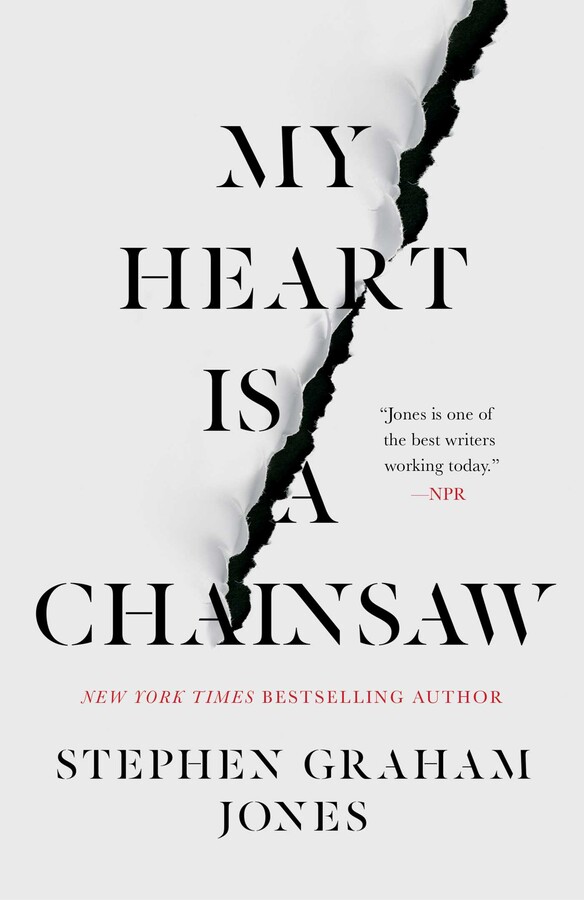 Saga Press / August 2021
Saga Press / August 2021
Reviewed By: Vince A. Liaguno
All roads lead to somewhere, and if you’ve traveled the Stephen Graham Jones literary highway for as long as this reviewer has, you’ll know that My Heart Is a Chainsaw, the Bram Stoker Award® winner’s latest, has been the destination all along. From his earliest meta-filled works like Demon Theory to his literary flirtations with the often scoffed-at horror subgenre he unapologetically loves like The Night of the Mannequins and The Last Final Girl, Jones finally brings both his adoration and encyclopedic knowledge of the slasher genre full circle. My Heart Is a Chainsaw is but the first of many pinnacles in a career that’s just finally beginning to get the mainstream attention and accolades it so richly deserves.
Jade Daniels, the novel’s exceedingly flawed but lovable protagonist, is the quintessential high school outcast. Living in the economically-depressed Idahoan town of Proofrock, Jade is the product of an absent mother and abusive, alcoholic Indigenous father, which renders her a survivor from the start. More at home with her beat-up VCR and stash of beloved 80s-era slasher films than people, Jade views her daily life in Proofrock through a kaleidoscope of slasher movie reference points. The banality of her life is punctuated by a dead-end custodian job at the high school from which she’s kinda-sorta just graduated and her frequent run-ins with the town’s sheriff. Only when a new luxury community called Terra Nova begins to go up on the other side of the town’s aptly-named Indian Lake—here the stand-in for the railroad tracks that usually separate the haves from the have-nots—does Jade’s predicted life course take a detour.
When two Dutch tourists are killed in grisly fashion on Indian Lake, Jade recognizes what no one else does—or even can: A new slasher cycle has commenced. Through the lens of her exhaustive knowledge of the slasher genre, Jade predicts and tries to warn of what’s to come. Trouble is no one’s listening to the notoriously troubled town rebel at the outset. Eventually, Jade convinces Letha Mondragon, daughter of one of Terra Nova’s founding gentrificationists, that not only has a slasher come to Proofrock but that she’s identified Letha as the archetypal final girl in this real-life narrative.
Although the plot takes all the requisite twists and turns leading up to the anticipated unleashing of the promised slasher mayhem, Jones uses his expertise and familiarity with the genre to brilliantly deviate from what’s expected, giving readers both a sly subversion and brilliant deconstruction of the genre in the process. Even amidst a hefty body count, Jones finds and elevates the humanity of the story through Jade, who is the composite of every final girl we’ve ever encountered in one of these films. He celebrates her resiliency and crafts a transformation that feels authentic and every bit deserved.
Jones wears his love of the slasher movie on his sleeve—make that both sleeves—in My Heart Is a Chainsaw. From the slasher-named chapters to a series of cleverly placed essays on films and tropes of the genre that masquerade as the extra credit history papers Jade needs to graduate, Jones paints the pages of Chainsaw a bright slasher red. And while there’s a cool in-crowd vibe to this generous layering of Easter eggs for his slasher brethren, Jones wisely crafts a compelling narrative that doesn’t exclude even the most casual of readers who perhaps aren’t as familiar with the novel’s slasher leanings. Still, Chainsaw is less a meta-deconstruction of the genre than it is a self-referential submersion into it. In other words, readers aren’t one of the partygoers listening to Randy’s dissertation on the rules for surviving a horror movie in Wes Craven’s Scream; they’re a character in the virtual reality of the movie itself, learning the rules as they run, scream, and try to hide from the maniacal killer. Like Jade, they’re trying to stay one step ahead—only to have the rug pulled out from under them again and again. Ultimately, knowledge is survival.
Layered in among the carnage, Jones seamlessly weaves a broader social commentary on the insidiousness of colonialism, gentrification, and environmental destruction into his narrative, saving some of his harshest criticism—here doled out in the form of bloody slaughter with everything from machetes to nail guns—for the arrogance of capitalism and the microaggressiveness of entitlement. In the hands of a lesser writer, injecting this type of weighty subject matter into a thriller plot could spell a pacing disaster; thankfully, Jones lands his punches and blackens a few eyes without knocking anyone out in the process.
Part homage to a beloved film genre, part coming-of-age story, My Heart Is a Chainsaw is Stephen Graham Jones at his most accomplished. With a finely-cultivated distinctiveness in voice, Jones cements his reputation as a master storyteller. It’s a triumphant novel of breakneck pacing and ingenious construction told through the eyes of a damaged heroine who finds solace—and, ultimately, salvation—in the same films that bring so many of us of a certain age a reassuring sense of nostalgic comfort. While the violence inherent in the slasher film may be an odd choice from which to derive such sense of redemption and wellbeing, Jones knows it so intimately that he’s able to simultaneously convey and dispel its illogic as a therapeutic agent of healing, proving himself a literary virtuoso.
Purchase My Heart Is a Chainsaw by Stephen Graham Jones here.